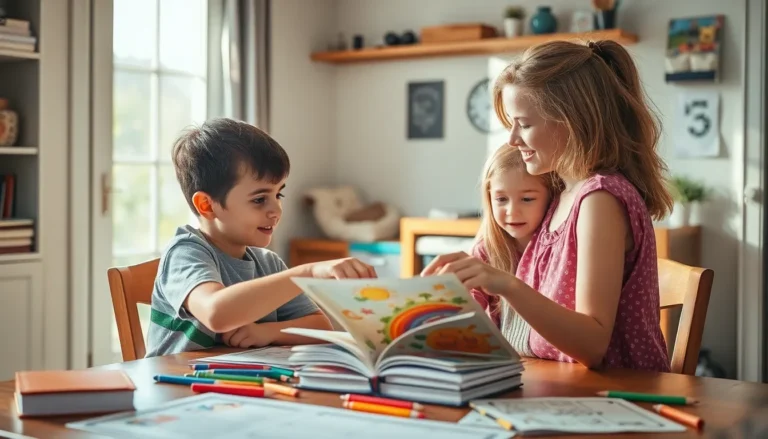Table of Contents
ToggleWhen it comes to parenting, not all styles are created equal. Enter Diana Baumrind, the parenting guru whose research has shaped how we understand family dynamics. With her groundbreaking work, she identified four distinct parenting styles that can make or break a child’s future. From the authoritative to the permissive, each style has its quirks and consequences, much like a buffet where some dishes are a hit while others leave a questionable taste.
Overview of Diana Baumrind’s Parenting Styles
Diana Baumrind’s research identifies four primary parenting styles: authoritative, authoritarian, permissive, and uninvolved. Each style displays distinct traits and influences child development differently.
Authoritative parenting combines warmth and structure. Parents set clear expectations while offering support, fostering independence and self-discipline. Studies link this style to positive outcomes in children’s social skills and academic performance.
Authoritarian parenting emphasizes strict rules and high expectations. Parents enforce compliance with little room for negotiation. This style often corresponds with lower self-esteem and increased anxiety in children, as emotional connections may be neglected.
Permissive parenting features a high degree of warmth but lacks adequate boundaries. Parents prioritize their child’s desires over discipline. Children in these environments might struggle with self-regulation and authority, leading to challenges in social interactions.
Uninvolved parenting, marked by minimal engagement or responsiveness, can hinder child development significantly. Parents may be emotionally distant, resulting in negative academic and social consequences. Children often experience feelings of neglect, impacting their overall well-being.
Comparative analysis of these styles reveals that authoritative parenting tends to yield beneficial outcomes, while uninvolved and authoritarian approaches may lead to challenges. Awareness of these parenting styles helps caregivers choose strategies that best support their children’s growth and development.
Authoritative Parenting Style
Authoritative parenting blends warmth with structure, creating an environment for children that promotes independence and responsibility. This style encourages open communication, allowing children to express their thoughts while still adhering to established rules.
Characteristics of Authoritative Parenting
Authoritative parents set clear expectations, balancing demands with emotional support. They provide rational explanations for rules, fostering understanding rather than blind obedience. Consistency defines their approach, helping children recognize the significance of their actions. Empathy and responsiveness mark interactions, allowing for healthy parent-child relationships. Structure and guidance lead to an environment where children feel secure yet free to explore.
Benefits of Authoritative Parenting
Children raised under authoritative parents often display higher self-esteem and self-discipline. These children tend to excel in academics and social skills, showcasing effective communication. Research indicates that they are more capable of managing stress and displaying resilience. Healthy coping mechanisms develop within the nurturing environment, equipping them for future challenges. Overall, authoritative parenting significantly correlates with positive adolescent and adult outcomes, promoting well-rounded individual growth.
Authoritarian Parenting Style
Authoritarian parenting is characterized by strict rules and high expectations without much room for flexibility. Parents often emphasize obedience and discipline, requiring children to follow established guidelines without question.
Characteristics of Authoritarian Parenting
Expectations remain consistently high in authoritarian households. Discipline methods include strong consequences for disobedience, with little explanation provided. Communication tends to be one-sided, with parents exerting control rather than fostering dialogue. Emotional support is often limited, leading to children feeling disconnected. Instead of encouraging independence, authoritarian parents prioritize compliance over exploration.
Potential Drawbacks of Authoritarian Parenting
Lower self-esteem frequently emerges in children raised under authoritarian practices. Anxiety levels can increase due to constant pressure to perform perfectly. Children may struggle with decision-making skills since they’re not encouraged to express opinions or weigh options. Relationship difficulties also arise, as these children might find it hard to trust authority figures outside the home. Academic performance may suffer due to stress, as children prioritize pleasing parents over setting personal goals.
Permissive Parenting Style
Permissive parenting features a high level of warmth paired with few rules or boundaries. This approach often results in a relaxed atmosphere that encourages self-expression.
Characteristics of Permissive Parenting
Parents who practice permissive parenting tend to prioritize their child’s freedom. They commonly avoid imposing strict regulations and often give in to children’s requests. Emotional support remains integral, promoting an open dialogue about feelings and preferences. Generally, permissive parents display a friendly and nurturing demeanor while providing minimal structure. Children may feel comfortable expressing their thoughts but lack guidance on behavior and expectations.
Effects on Child Development
Children raised in permissive households often struggle with self-regulation. These children might experience challenges in adhering to rules, impacting their ability to manage emotions and behaviors. As a result, they may find it difficult to navigate authority figures. Academic performance can also suffer due to a lack of discipline and focus. Overall, offspring of permissive parents may exhibit lower self-esteem and face issues forming healthy relationships, ultimately leading to potential difficulties in various life domains.
Neglectful Parenting Style
Neglectful parenting, also known as uninvolved parenting, emphasizes minimal engagement and emotional support. This style reflects a lack of responsiveness to a child’s needs, leading to various challenges in their development.
Characteristics of Neglectful Parenting
Neglectful parenting is characterized by a lack of involvement in a child’s life. Parents frequently fail to provide nurturing or supervision. Emotional distance becomes evident, as these parents often ignore their child’s needs and desires. Additionally, there are minimal expectations set for behavior or achievement. Structure tends to be absent, resulting in children feeling unsupported and unloved. Autonomy is likely left unchecked, as neglectful parents rarely intervene in their child’s decision-making processes.
Consequences for Children
Children raised in neglectful environments often experience significant emotional struggles. Low self-esteem emerges, as they feel unworthy and unvalued. Academic performance may decline due to insufficient guidance and support. Social skills become impaired, making it difficult for these children to form meaningful relationships. Furthermore, behavioral issues frequently arise as children seek attention through negative actions. These consequences can lead to long-term psychological effects, highlighting the importance of parental involvement in healthy child development.
Understanding Diana Baumrind’s parenting styles offers valuable insights into child development. Each style presents distinct advantages and challenges that can shape a child’s emotional and social growth. Authoritative parenting stands out for its balanced approach, promoting independence while nurturing self-discipline.
In contrast, authoritarian, permissive, and uninvolved styles can lead to various challenges in children’s lives. Recognizing these differences empowers parents and caregivers to adopt strategies that align with their values and their child’s needs. By fostering a supportive environment, they can significantly influence their child’s future success and well-being. Making informed choices about parenting styles can pave the way for healthier relationships and more resilient children.







